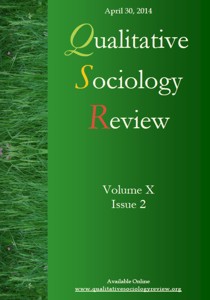“I Feel Like I’m Going to Win”: Superstition in Gambling
DOI:
https://doi.org/10.18778/1733-8077.10.2.05Keywords:
Gambling Behavior, Gambling Beliefs, Magic, Personal Luck, SuperstitionAbstract
Drawing on in-depth interviews with recreational gamblers (N=67), the paper focuses on superstitious beliefs and practices used by players of various games to influence or control outcomes. The study was conducted in the spirit of the interpretative approach formed by folklorist Alain Dundes (1961). Results suggested that superstition, in a variety of forms – signs, magic, conversion – was clearly an accepted part of gambling for most respondents. Although more pronounced in games of chance, superstition appeared to be more significant in the experience of interviewees who played skill games, creating “illusion of control.” Future research on the link between superstition and religion, and on the role of social networks in fostering and developing superstition-related knowledge is warranted.
Downloads
References
Aarnio, Kia. 2007. Paranormal, Superstitious, Magical, and Religious Beliefs. PhD Thesis, University of Helsinki, Finland.
Google Scholar
Bailey, Michael. 2007. Magic and Superstition in Europe. A Concise History from Antiquity to the Present. Lanham, MD: Rowman & Littlefield Publishers.
Google Scholar
Belmont, Nicole. 1979. “Superstition et religion populaire dans les sociétés occidentales.” Pp. 53-70 in La fonction symbolique, edited by M. Izard M. and P. Smith. Paris: Gallimard.
Google Scholar
Bersabé, Rosa and Rosario Martínez Arias. 2000. “Superstition in Gambling.” Psychology in Spain 4(1):28-34.
Google Scholar
DOI: https://doi.org/10.24310/espsiescpsi.vi4.13452
Bloch, Herbert A. 1951. “The Sociology of Gambling.” American Journal of Sociology 57(3):215-221.
Google Scholar
DOI: https://doi.org/10.1086/220938
Caillois, Roger. 1961. Man, Play, and Games. New York: Free Press of Glencoe.
Google Scholar
Campbell, Colin. 1996. “Half-Belief and the Paradox of Ritual Instrumental Activism: A Theory of Modern Superstition.” The British Journal of Sociology 47(1):151-166.
Google Scholar
DOI: https://doi.org/10.2307/591121
Curtis, Bruce and Cate Wilson. 2001. “Everyday Gambling in New Zealand.” Pp. 210-233 in Sociology of Everyday Life in New Zealand, edited by C. Bell. Palmerston North: Dunmore Press Limited.
Google Scholar
D’Agati, Marina. 2004. “Gioco d’azzardo e modernità: una prospettiva sociologica.” Rassegna Italiana di Sociologia 1(1):79-102.
Google Scholar
D’Agati, Marina. 2005. “Credenze fallaci e gioco d’azzardo.” Pp. 119-135 in Associazione Italiana di Sociologia, Giovani Sociologi 2004. Milan: Franco Angeli.
Google Scholar
Delacroix, Eva and Valérie Guillard. 2008. “Understanding, Defining, and Measuring the Trait of Superstition.” Paper presented at the IAREP/SABE World Meeting, September 6, Rome, Italy.
Google Scholar
Devereux, Edward. 1968. “Gambling.” Pp. 53-62 in International Encyclopedia of the Social Sciences, 6th volume, edited by D. L. Sills. New York: Macmillan & Free Press.
Google Scholar
Dundes, Alan. 1961. “The Structure of Superstition.” Midwest Folklore 11(1):25-56.
Google Scholar
Frazer, James. 1890. The Golden Bough. London: Macmillan.
Google Scholar
Friedland, Nehemia. 1998. “Games of Luck and Games of Chance: The Effect of Luck-versus Chance-orientation on Gambling Decisions.” Journal of Behavioral Decision Making 11(3):161-179.
Google Scholar
DOI: https://doi.org/10.1002/(SICI)1099-0771(199809)11:3<161::AID-BDM296>3.0.CO;2-S
Foster, Kevin and Hanna Kokko. 2009. “The Evolution of Superstitious and Superstition-like Behaviour.” Proceedings of the Royal Society B 276(1654):31-37.
Google Scholar
DOI: https://doi.org/10.1098/rspb.2008.0981
Griffiths, Mark and Richard T. A. Wood. 2000. “Risk Factors in Adolescence: The Case of Gambling, Videogame Playing, and the Internet.” Journal of Gambling Studies 16(2/3):199-225.
Google Scholar
DOI: https://doi.org/10.1023/A:1009433014881
Henslin, James M. 1967. “Craps and Magic.” American Journal of Sociology 73(3):316-330.
Google Scholar
DOI: https://doi.org/10.1086/224479
Hergovich, Andreas, Reinhard Schott, and Martin Arendasy. 2005. “Paranormal Belief and Religiosity.” Journal of Parapsychology 69(2):293-303.
Google Scholar
Kramer, Thomas and Lauren Block. 2008. “Conscious and Nonconscious Components of Superstitious Beliefs in Judgment and Decision Making.” Journal of Consumer Research 34(6):783-793.
Google Scholar
DOI: https://doi.org/10.1086/523288
Ladouceur, Robert. 2004. “Perceptions Among Pathological and Non-pathological Gamblers.” Addictive Behaviors 29(3):555-565.
Google Scholar
DOI: https://doi.org/10.1016/j.addbeh.2003.08.025
Ladouceur, Robert and Michael Walker. 1996. “A Cognitive Perspective on Gambling.” Pp. 89-120 in Trends in cognitive therapy, edited by P. M. Salkovskis. Oxford: Wiley.
Google Scholar
Langer, Ellen J. 1975. “The Illusion of Control.” The Journal of Personality and Social Psychology 32(2):311-328.
Google Scholar
DOI: https://doi.org/10.1037/0022-3514.32.2.311
Lindeman, Marjaana and Kia Aarnio. 2007. “Superstitious, Magical, and Paranormal Beliefs: An Integrative Model.” Journal of Research in Personality 41(4):731-744.
Google Scholar
DOI: https://doi.org/10.1016/j.jrp.2006.06.009
Malinowski, Bronisław. 1955. Magic, Science, and Religion. New York: Doubleday.
Google Scholar
Pihlström, Sami. 2007. “Religion and Pseudo-Religion: An Elusive Boundary.” International Journal for Philosophy of Religion 62(1):3-32.
Google Scholar
DOI: https://doi.org/10.1007/s11153-007-9120-2
Reith, Gerda. 1999. The Age of Chance: Gambling in Western Culture. London: Routledge.
Google Scholar
Stanke, Amanda. 2004. “Religiosity, Locus of Control, and Superstitious Belief.” UW-L Journal of Undergraduate Research 7:1-5.
Google Scholar
Sundali, James and Rachel Croson. 2006. “Biases in Casino Betting: The Hot Hand and the Gambler’s Fallacy.” Judgment and Decision Making 1(1):1-12.
Google Scholar
Tversky, Amos and Daniel Kahneman. 1971. “The Belief in the Law of Small Numbers.” Psychological Bulletin 76(1):105-110.
Google Scholar
DOI: https://doi.org/10.1037/h0031322
Weiss, Stephen M., Robert M. Demski, and George J. Backen. 2011. “Fantasy Baseball: A New Way to Gamble or Just Another Game?” Journal of Gambling Issues 26:125-145.
Google Scholar
DOI: https://doi.org/10.4309/jgi.2011.26.9
Wohl, Michael and Michael Enzle. 2002. “The Deployment of Personal Luck: Sympathetic Magic and Illusory Control in Games of Pure Chance.” Personality and Social Psychology Bulletin 28(10):1388-1397.
Google Scholar
DOI: https://doi.org/10.1177/014616702236870
Wohl, Michael, Melissa J. Stewart, and Matthew Young. 2011. “Personal Luck Usage Scale (PLUS): Psychometric Validation of a Measure of Gambling-related Belief in Luck as a Personal Possession.” International Gambling Studies 11(1):7-21.
Google Scholar
DOI: https://doi.org/10.1080/14459795.2010.541270
Žeželj, Iris et al. 2009. “Construction and Behavioral Validation Of Superstition Scale.” Psihologija 42(2):141-158.
Google Scholar
DOI: https://doi.org/10.2298/PSI0902141Z
Zola, Irving K. 1963. “Observations on Gambling in a Lower-Class Setting.” Social Problems 10(4):353-361.
Google Scholar
DOI: https://doi.org/10.2307/799206
Downloads
Published
How to Cite
Issue
Section
License

This work is licensed under a Creative Commons Attribution-NonCommercial-NoDerivatives 4.0 International License.











